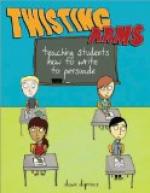A few weeks later. We are back in Brighton. An Australian uncle and family are staying with us. Ma is ill in bed. I get up at 6 A.M., tramp over the downs and in a place I wot of, some five miles away, I gather heather for Ma. I run. I get back by 8.30. I find my uncle and cousins getting into a cab. Some one says, “How lovely! Are these for me?” I grip them in despair. They are for Ma. “Quite right,” says someone. A day or two later my heather was placed, still blooming, on Ma’s grave.
I was sixteen then. Six years later I return home from abroad. Within a few weeks of my return I am sitting in Pa’s room in agony, listening to him fight for breath. The fight at last weakens. I hear him whisper, “Help! help!” I set my teeth. The others come in. There is silence. All is over. I am given my father’s ring. It is my most treasured possession.
Henceforth all I have left of home is Hilda, for she alone is unmarried. Ever since my mother’s death she has been my confidante. As far as was possible she has taken Ma’s place in my life, and I have taken Hugh’s place in hers. We are substitutes. For that reason as we get older we get to know each other better, and to know better how much we can give to each other. There is more criticism between us than there would have been between Ma and me, and Hilda and Hugh. But it has its advantages. We live apart, but we correspond weekly, and holiday together. It is all that is left of home, and it is infinitely precious.
Now that I have written these pages I can see as I have never seen before how much the child was father of the man. Since those home days I have had more variety of experience perhaps than falls to the lot of most men, and I would almost say more varied and more epoch-making friendships. Yet in these pages that I have written I seem to see all the essential and salient features of my character already mirrored and formed.
I am still by nature lethargic and placid. I could still occupy myself contentedly With bricks and soldiers, art and history, and trouble no one. But there is still that other element, instilled by Hugh—a love of the open air, of struggle with the elements, in lonely desert places.
I have never lost the craving for true religion, which induced my mother to go to a poor church to worship, and to visit the drunken and helpless in their slums. I have never lost the desire for her singleness of mind, and simple loyalty to Christ and His Church. At the same time I have never lost my father’s inquiring spirit, broad view, love of doctrine tempered by reason and founded on history and tested by human experience. When these two beloved ones passed from this world I learnt the meaning of the text, “Where your treasure is, there will your heart be also.” My heart has never been wholly in this world.




